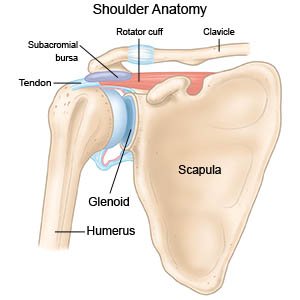Shoulder Impingement Syndrome
Medically reviewed by Drugs.com. Last updated on Aug 4, 2025.
AMBULATORY CARE:
Shoulder impingement syndrome
happens when the tendons or bursa become trapped between bones of your shoulder joint. You have pain when you reach over your head or lie on the shoulder while sleeping. You may also have pain when you move your arm out to the side or behind your body.
 |
Seek care immediately if:
- Your shoulder, arm, hand, or fingers turn bluish or pale, or feel cold or numb.
- Your pain gets worse, even after rest and medicine.
- You cannot move your fingers.
Related medications
Call your doctor if:
- You have questions or concerns about your condition or care.
Treatment may include:
- Rest will help your shoulder pain. Limit reaching above your shoulder's height.
- Apply ice on your shoulder for 20 minutes 1 or 2 times in a day. Use an ice pack, or put crushed ice in a plastic bag. You may also use a bag of frozen peas or corn. Cover the bag with a towel. Ice decreases swelling and pain.
- Physical therapy will teach exercises to stretch and strengthen your shoulder. Exercises will also help decrease pain.
- Medicines may be given to relieve pain and swelling.
- Surgery may be needed if your rotator cuff is torn or other treatments do not work.
Follow up with your doctor and physical therapist as directed:
Write down your questions so you remember to ask them during your visits.
© Copyright Merative 2025 Information is for End User's use only and may not be sold, redistributed or otherwise used for commercial purposes.
The above information is an educational aid only. It is not intended as medical advice for individual conditions or treatments. Talk to your doctor, nurse or pharmacist before following any medical regimen to see if it is safe and effective for you.
Further information
Always consult your healthcare provider to ensure the information displayed on this page applies to your personal circumstances.
